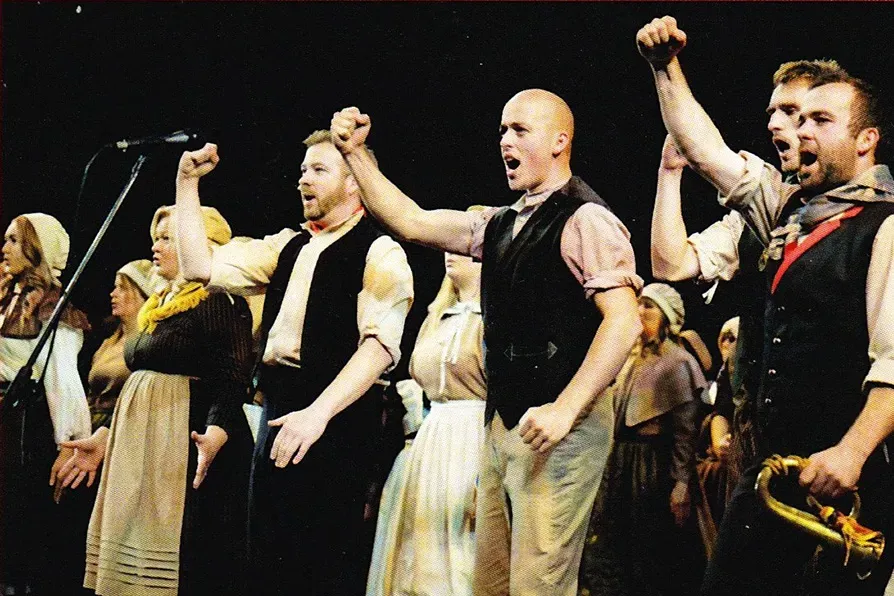The Bard stands with the Reformers of Peterloo, and their shared genius in teaching history with music and song
MEIC BIRTWHISTLE relishes a fine production by an amateur company of a rousing exploration of Wales' radical history

 Pic: Courtesy of Cwmni Theatr Maldwyn
Pic: Courtesy of Cwmni Theatr Maldwyn
Pum Diwrnod o Ryddid / Five Days of Freedom
Cwmni Theatr Maldwyn
★★★★★
IMAGINE a highly successful musical show celebrating the use of armed revolt in order to achieve workers’ democratic rights in the British Isles. One that sold out performances and required extra matinees to meet demand. And these for a dramatic piece originally performed back in 1988 and only recently revived last autumn — yet still packing them in venues across Wales.
Well that’s what we have just experienced with Pum Diwrnod o Ryddid / Five Days of Freedom a Welsh-language musical representation of the 1839 Chartist Revolt at Llanidloes. It was a revolt against tyranny in a small town in rural mid-Wales but one that Frederick Engels noted when collecting material for a work on Chartism in Britain. For this was a preview of what was to occur again later that year in Wales at Newport, Monmouthshire, on a greater scale.
As the famous anthem of this musical declares:
“Ar noson fel hon fe heriwn y Brenin a’i lu
Gosodwn ein gwarchae
Ar derfyn pob stryd
Fe welwn ni’r dorf
… yn barod i ymladd a cholli eu gwaed.”
“On a night like this we will challenge the King and all his forces
We will set up our barricades
Immovable at the end of each street.
And we will see the crowd
Firmly standing on their feet
… ready to fight and shed their blood.”
In the spring of that fatal year of 1839 the textile workers of Montgomeryshire revolted against their appalling working conditions and the ever-present threat of the new workhouses. They embraced the fast-growing idea of gaining a democratic voice to help right those wrongs. And when three leading members of their number were seized by the authorities they freed them by force, and took control of Llanidloes holding it for “Five Days of Freedom.” As the play shows they scared the hell out of the gentry and emergent bourgeoisie of the county who eventually imprisoned and transported the leadership.
The highly regarded amateur Cwmni Theatr Maldwyn has once again staged this enthralling piece of musical theatre. The production forcefully projects the division of the world of the workers from that of the ruling elite through the set and stage action. The oppressor classes are portrayed almost as pantomime villains. And the workers as a mass, but one where ideas, ideals and decisions are now to be debated and voted on. The plot is almost entirely a series of catchy but highly political songs, accompanied by the applause by the audience.
The people of these islands have too often been told that democracy was handed down by a wise and benevolent ruling class, rather than achieved by mass struggle.
Here is a popular play and production that teaches of the workers’ struggle, and that through the exciting medium of drama, dance and song. For as the chorus of the people sing:
“Fe godwn ein gwydrau i’r newid a ddaw.
Fe fynnwn ni godi y werin o’r baw.
Rhown faner y gweithwyr ar ben ucha’r tŵr
A gwaeddwn ein Siarter i gyd fel un gwr.”
“We’ll raise our glasses to the change that will come.
We will raise the people from the dirt.
We will place the workers’ flag on the topmost tower.
And as one man we will shout the message of our Charter.”
Run ended.

MEIC BIRTWISTLE offers an appreciation of the renaissance man GARETH MILES

GORDON PARSONS is blown away by a superb production of Rostand’s comedy of verbal panache and swordmanship












